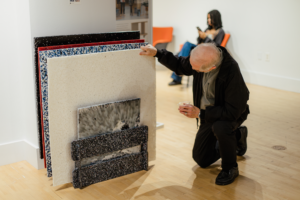
In August 2023, Jared Seifert and Lauren Copping, two 2018 graduates from Kendall College of Art and Design, launched Design Declassified, a company that aims to turn recycled plastics into 100% recycled sheet materials that can then be used to make new products such as countertops, furniture, lighting, and home goods.
“During a trip to Bali, we witnessed communities gather plastic from rice fields, beaches, and streams and turning them into sheets, furniture, and architectural wall cladding,” Seifert said. “I was familiar with the material before but seeing how these communities were implementing the material to create new products really blew me away. And we felt that this innovation needed to be brought back to the U.S.”
The company uses a variety of different plastics to make the sheets including milk jugs, detergent bottles, plastic bags, pill containers, food packaging, yogurt cups, and automotive parts. Every one of its products is made with like material. The idea is that the entire product can be easily recycled again if needed.
Design Declassified produces materials that are 36” x 36” and come in four different thicknesses: 0.375”, 0.5”, 0.75”, & 1”. According to its website, the company is actively investing in machinery to make larger sheets.
 “The sheets can be used for various furniture, lighting, and product solutions such as table surfaces, or door faces for cabinetry, and outdoor furniture like end tables, and stools. The sky’s the limit—you can heat the material and even thermoform it form it into a curved back or a lampshade,” Seifert said.
“The sheets can be used for various furniture, lighting, and product solutions such as table surfaces, or door faces for cabinetry, and outdoor furniture like end tables, and stools. The sky’s the limit—you can heat the material and even thermoform it form it into a curved back or a lampshade,” Seifert said.
The materials are sourced through Rockford Sustainability Committee, a volunteer group that accepts community recyclables, as well as by working with local recyclers.
“Since we started the business, we’ve worked with different recyclers and compounders that have helped us identify specific feed streams of recycled materials that go through their facilities,” Seifert said. “That’s what makes our materials special, they’re from a local supply chain and we can pinpoint the original recycled materials.”
Often, local Michigan recyclers will help Designed Declassified find specific colors of high-density polyethylene in their feed streams that the company can use in their sheets, or the recyclers connect the company to feed streams that don’t always have high volumes but can still be diverted to Designed Declassified because the company operates on a small volume.
“There’s a lot of flexibility,” Seifert said. “We’re looking for partners that are willing to collaborate, we understand that what we’re looking for isn’t the norm for a plastic company and we know it takes time to see these materials flow through a facility and recognize if it’s a consistent flow that can be separated from other materials being processed.”
Last year from August to December, Design Declassified held an exhibition at Kendell College’s FLEXgallery called Fragments to Form, which showcased the company’s business cycle.
 “Lauren and I both graduated from Kendall College of Art and Design, she was in the interiors program, and I was in industrial design,” Seifert said. “We reached out to the college to share our work and interest in illustrating our innovative materials in a series.”
“Lauren and I both graduated from Kendall College of Art and Design, she was in the interiors program, and I was in industrial design,” Seifert said. “We reached out to the college to share our work and interest in illustrating our innovative materials in a series.”
The exhibit included a discovery phase, a room that illustrated the inspiration behind the company as well as demonstrating the process of how Design Declassified takes the recycled plastic, shreds them, and turns them into the sheets.
“We also had a room that showed the ‘imagine phase’ where we collaborated with industrial designers and manufacturers to create unique solutions utilizing the materials. We had designers use the sheets for lighting, drawer fronts, desks, and other furniture pieces,” Seifert said.
According to Seifert, the goal of the exhibit was to demonstrate the variety of opportunities to use recycled plastics and other materials to create new products.
“We also hope it inspired others to be conscious about plastic consumption,” he said. “And we wanted to focus on how we can recycle these materials properly so they can be used in new, innovative materials like or sheets, or into something completely different.”
As Design Declassified looks to its future, the company intends to make several strategic plans by developing larger format sheets that can help the team scale with better material yield for manufacturers to integrate into the designers or products.
“We want to be a wholesaler of 100 percent recycled plastic sheet materials,” Seifert said. “I’m an industrial designer so I’ll always be creating stools or similar items. While we’ll continue selling those products, our long-term goal is to distribute our sheets for others to use to make new creations.”
Photo credit: Kendall College of Art & Design | Ellen Dziubek.

In August 2023, Jared Seifert and Lauren Copping, two 2018 graduates from Kendall College of...